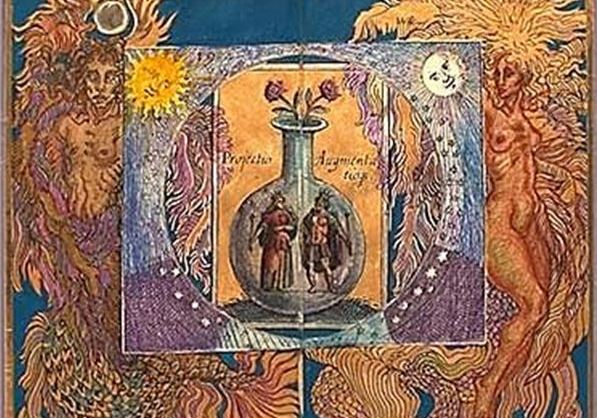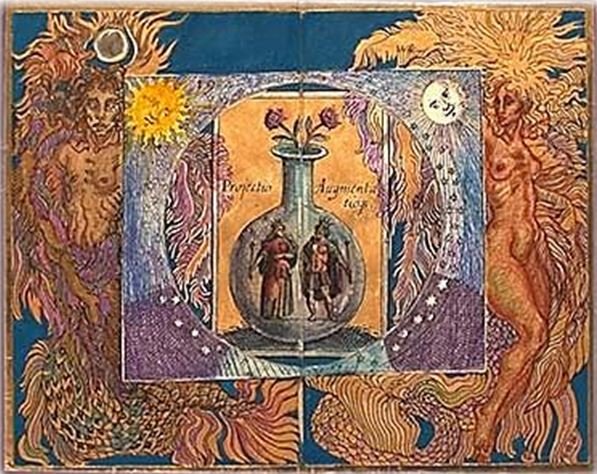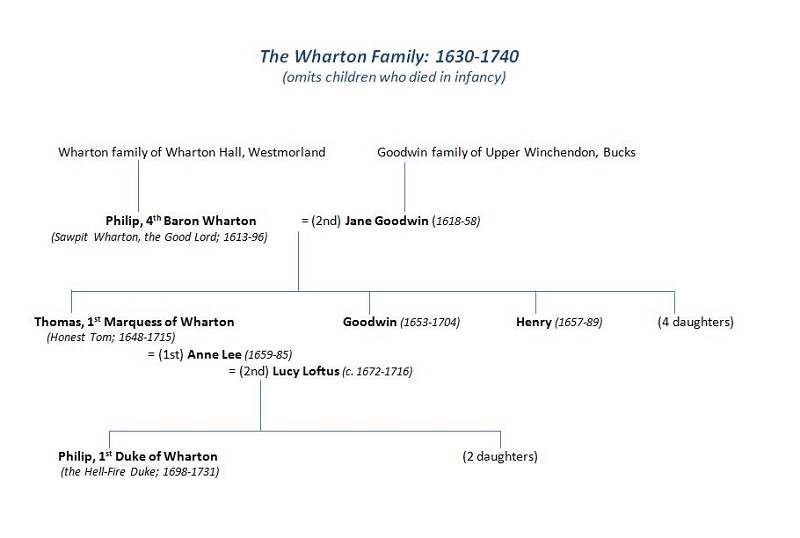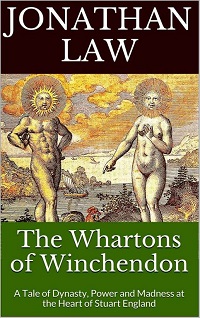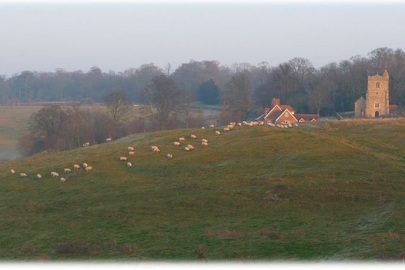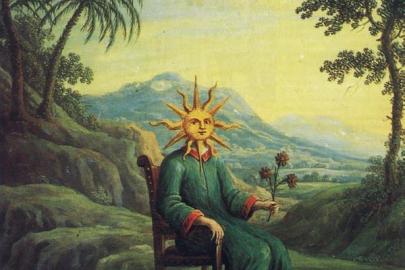Continuing our 10-part weekly serialisation of Jonathan Law’s The Whartons of Winchendon… As we saw last week, Goodwin Wharton was able to communicate with the fairies. But that was merely a warm-up, as before long he was receiving messages direct from God, with bizarre consequences…
It was in the October of 1684 that Goodwin Wharton finally heard the angels speak. Earlier that year Mary Parish, his partner and tutor in the occult mysteries, had compelled the archangel Uriel – regent of the sun and flame of God – to appear in a glass of water. Over the following months a procession of angels – including the mighty Gabriel himself – had appeared in Mary’s glass: but all addressed their words to her alone. Honoured as he was by these visitations, Goodwin had longed to hear the angels for himself; and now – as he knelt in front of the makeshift altar in his London lodgings – it seemed that his prayer was being granted. The voice was strong and clear and the message could hardly have been more definite or more encouraging; he, Goodwin Wharton, was destined to be the greatest king who ever lived, subordinate only to Christ.
At last – after all these months of dealing with skittish fairies and riddling spirits – here was a voice that could be trusted without fear. It was surely inconceivable that Uriel or Gabriel or any other messenger of the Supreme God would lead him off on a dance to Hounslow or the Northend woods. From now on everything was going to be different.
That winter would be the hardest in living memory – the Thames froze solid and ice sheets formed some two miles out to sea – but the candles continued to flicker on Goodwin’s little altar and the angels continued to speak. Sometimes, in the dark and the cold, Goodwin formed an impression that the voices came from behind him, where Mary sat crouched in the shadows. Once or twice he even thought he saw her lips move – could it be that the angels of God spoke through her physical form? However, when he raised the matter with Mary, she reproached him very bitterly; he was to repent earnestly and never suggest anything of the sort again – or the angels would quite certainly not return.
Goodwin took this rebuke in a humble spirit and his reward was a further momentous breakthrough. In the spring of 1685 he heard the voice of God Himself, promising that he would be “the happiest of men” if only he would continue to keep faith. By the end of the year God would be speaking to Goodwin on a daily basis, generally in rhyming verse of admirable clarity if somewhat approximate metre:
Rise , Wharton, rise, do not be dismayed,
Though I the Lord, have this burden on thee laid,
But in my time I’ll make thee surely free
And take the yoke and burden off of thee.
Unlike the voices of the angels, God’s voice seemed to come through the door or the walls, and only when Mary was not in the room.
Amazed and a little disturbed by these revelations, Goodwin now began to set down the astonishing story of his life, producing some 200,000 words in a matter of weeks. The memoir, which would eventually fill two large folio volumes, took the form of a letter to Peregrine, the son he had never seen; in strenuous detail Goodwin explained both the assurances that he had received and the awesome destiny that lay before him. He also provided a full account of his adventures with the fairies and spirits – high matters of which the world would otherwise have remained ignorant.
***
If Mary’s intention had been to boost Goodwin’s morale while binding him still more closely to herself, then her plan backfired on both counts. In the mid-1680s Goodwin’s inner world gets darker and stranger – at once more tortuously introverted and more dangerously entangled with public affairs. He begins to have weird experiences that have nothing to do with Mary, and that sometimes amount to actual hallucinations. Goodwin sees inexplicable flashes of fire that he takes to be the Lord’s glory, meets Christ on a boat in Deptford Creek, and is twice attacked by Satan in a whirlwind. Voices tell him that he is the ‘Solar King of the World’, sent to repopulate his nation, and that he will establish God’s kingdom on earth. He is assailed by dreams and visions reflecting his troubled family life. Goodwin repeatedly saves Lord Wharton from execution, evades Tom’s attempts to have him assassinated, and rises above Anne’s attempts to renew their love affair from beyond the grave.
With all this, it is not surprising that Goodwin sometimes seemed to lose interest in the Lowlands, his fairy kingdom under Hounslow Heath. The summer of 1686 brought news of the death of Queen Penelope, the wife he had never met, and the succession of her sister, the treacherous Princess Ursula. Although the new queen was anxious to marry Goodwin, he was warned off by the angels, and resisted her attempts to sneak into his bed while he was asleep. Ursula would die within a year of her sister, leaving Goodwin the undisputed ruler of the fairy worlds.
Having become less central to Goodwin’s spiritual life, Mary spent most of 1686-87 in treasure-seeking schemes of her own, chiefly in the City of London. Over several months she explored secret chambers underneath a house at Ratcliff, where she discovered a rich treasure guarded by a spirit named Thomas Shashbesh. The passages here provided another way in to the fairy colonies at Hounslow and Moorfields, but turned out to be infested by alarming monsters (“great monstrous serpents, snakes, and toads, which lay warbling and heaving and rolling”). Other Indiana Jones-style adventures included a battle with the spirit of Cardinal Wolsey, as she plotted to seize the treasures he had hidden beneath an old house in the City. And through all this excitement Mary continued to conceive children at a marvellous rate. In 1685 she had given birth to five babies who all died in a matter of days. A further seven conceptions followed that summer, but only two children were born alive, and these also died soon after birth. Finally, in March 1687, she gave birth to a healthy boy named Hezekiah, who was immediately packed off to a nurse in Windsor – once again without Goodwin having so much as set eyes upon him.
For Goodwin, all these matters were overshadowed by new developments in his religious life. In the summer of 1687, during a rare visit to his father’s house at Wooburn, Goodwin became aware that God was speaking to him directly with an “inward voice”. If this was indeed the true voice of the Almighty, as seemed to be the case, then he would no longer be dependent on Mary and the angels for guidance. He would take his orders straight from the top. The inward voice continued to address him over the next few days, often about the most difficult and intimate matters. God now confirmed what Goodwin had long suspected, that his stepmother – Lord Wharton’s much younger wife – had strong suppressed feelings for him, and that these lay at the root of their fractious relationship. Goodwin was ordered to touch his stepmother with a magic frog-bone that would stir up her lust. He must then take the first opportunity to lie with her. Having secretly applied the frog-bone and successfully patched up their quarrel, Goodwin arranged a private meeting and kissed Lady Wharton on the mouth. She flew from him in horror.
Although bewildered by this setback, Goodwin had no time to brood; he soon learned that he had more important work in hand. God now commanded him to begin an affair with Queen Mary, the wife of his old enemy King James II. It was his destiny to produce an heir to the throne of England, all James’s male children to this point having died young. That Goodwin was ideally suited to this commission was plain, of course, from his extraordinary capacity for impregnating the other Mary, Mrs Parish. Goodwin would naturally insist that his child was brought up a Protestant, thereby resolving at a stroke the religious and dynastic issues that were threatening to tear the country apart.
Goodwin immediately set off for Bath, where the Queen was taking the waters in the hope that they would enhance her fertility. God now revealed that James was a dabbler in the black arts and that both he and the Queen used a spirit messenger called Phocas, who had been supplied by a wicked conjuror. Thanks to Phocas, Queen Mary already knew about Goodwin – and was determined to have him at any cost. James himself apparently blew hot and cold about the business, sometimes content to be cuckolded for the sake of an heir, sometimes not. At Bath Goodwin came into the Queen’s presence several times and noted unmistakable signs of her love – including a fierce jealousy of any other woman who spoke to him. Using Phocas as his messenger, Goodwin arranged several secret meetings but the Queen invariably backed out at the last moment – all depressingly like the late Queen Penelope. In his frustration, Goodwin fell back on seducing his landlady before deciding to return to London where he could pursue the affair at court.
In London Phocas relayed the astonishing news that King James had challenged Goodwin to a duel. Goodwin duly turned up at Lamb’s Conduit Fields with a second, but the King failed to show, thus confirming Goodwin’s opinion that James was a coward and a poltroon. Later that autumn it was announced that Queen Mary was pregnant; Goodwin realized from the start that this was a fraud, and when a son was born the following year took the Whig line that the baby had been smuggled into the royal chamber in a warming pan. As a man of the world and a father twice over he surely knew a false pregnancy when he saw one. The other Mary, his own, remained prodigiously fertile for a woman of almost 60, thereby confirming his role as the man who would repopulate a nation. Although Mary had miscarried nine children in September 1687, she conceived another 39 in the weeks after Goodwin’s return from Bath. In 1688 he was finally allowed to see young Hezekiah, who had been living under the assumed name of Knowles. Any doubts Goodwin might have entertained about the paternity were swept away by the warmth and joy with which the little lad received him.
Ironically, the birth of a male heir to King James was the one event that more than any other cost him his throne (a Catholic monarch might be borne, but a Catholic dynasty surely not). At the end of 1688, as the forces opposed to James began to look unstoppable, Goodwin made a surprise intervention. Using Phocas as an intermediary, he magnanimously offered to save his old enemy through the use of his secret powers. James, however, was too proud to accept; with his usual bad judgment, the King snubbed Goodwin’s offer, thus sealing his fate.
As we have seen, the Revolution of 1688 opened a new era for the Wharton family and made Tom, in particular, a great and powerful man. Goodwin had played no part in the Revolution – indeed, in his own way, he had done his best to prevent it – but family connections meant that he would share in the spoils. For a few years, in the 1690s, he would be almost as powerful as Tom. They would put him in charge of the Royal Navy.

